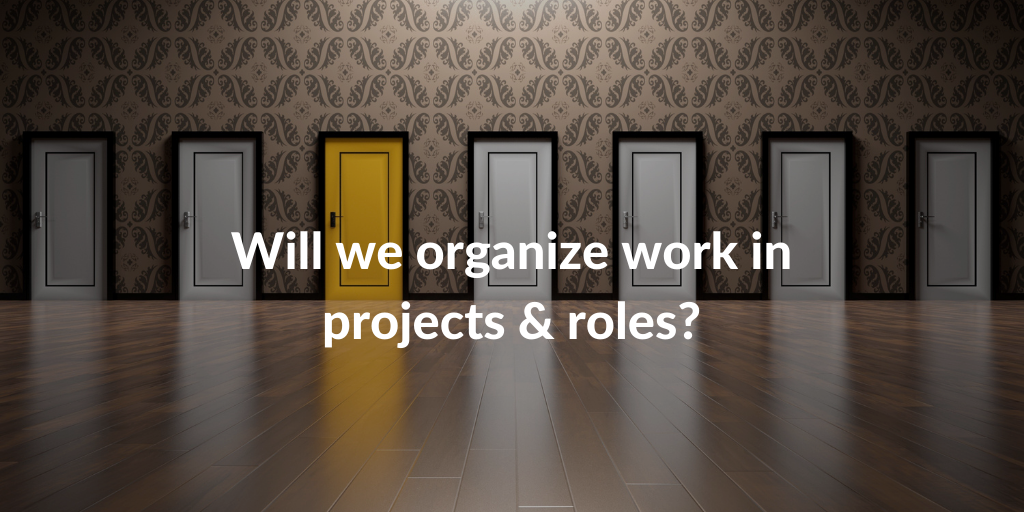The workforce organized via projects and roles

Jeroen Franssen – Senior Expert Talent, Labour Market & Labour Organisation – talks in a series of podcasts ‘Be the change’ about the future of work with different guests about their visions and expectations.
The first episode describes how the division of labour can be different and based on projects and roles instead of limited and predetermined positions. This is a vision that is shared amongst professionals and based on the ever-growing need for flexibility and digitalization.
These two factors are currently the two drivers of change in the workforce.
According to the principle of work organization via projects and roles, a career consists of a succession of project assignments. A professional can realize these project assignments at different employers. There will always be a need for certainty so it is highly unlikely that we will completely lose predetermined roles and contracts.
However, work organized via projects and roles fits with the ongoing changes and demands from companies.
It also provides professionals with the opportunity to discover new things and find a sense of belonging instead of just serving society in a limited occupation.
Work organization via projects and roles is a perfect fit for our rapidly evolving world, in which new business models, technology and global unified markets are demanding flexibility and in which digitization influences everything.
The 70:20:10 model for innovation
One thing that we can expect to see more often over the coming years is the introduction of the 70:20:10 model for innovation. Broadly speaking, the 70:20:10 model divides the job into three different sections.
70 percent of the time of a professional is focused on core tasks,
20 percent on another mission in a separate project, product or market
10 percent on transformational innovation.
The divide of time spent on projects this way has proven to be very effective and to increase the ROI.
Key for success is the inclusion of all employees and not to limit the use of the module to a singular team.
It is important that employees across the organisation operate and innovate in their day-to-day roles.
This 10 percent time spent on transformational innovation might not be 100 percent profitable for employers, only the future will tell. What is certain however is that this time investment increases the agility of the professional and the organisation and both parties will benefit from this.
Project-based ecosystems
Jeroen Franssen thinks that in the future, professionals will no longer be committed to one employer only.
Talents will work for various clients and project providers during their career. Employees might wonder what security they still have on the labour market, without a contract of indefinite duration.
But job security might be guaranteed even better in a project-based ecosystem of diverse providers than when professionals work solely for one employer.
Today, project-based ecosystems have not (yet) found their fixed and concrete form. The purpose of the theme around which work is organized can also form the backbone of an ecosystem. An ecosystem around healthcare than unites, for example, companies that approach the theme from a medical point of view, from a healthcare point of view and on a technological level.
The stronger these ecosystems, the more job security they offer. The director of such an ecosystem is something that still needs to be defined and will always be changing. Various parties will emerge to help shape this evolution.
Important is that, unlike the current situation, competition should not be part of this.
It should by no means become a survival of the fittest. What we need are companies that work together.
And such as making mutual agreements about the distribution of employees, depending on project needs.
Perhaps one example of a potentially successful project-based ecosystem is the Corda Campus in Hasselt: a cluster of young technology companies with high mutual employee mobility. Especially tech-savvy professionals have shown to easily switch from one company to the other, once their skills are no longer needed for a certain project. The campus also has a strong focus on networking, connections with the public sector and organizes many events. This might be a clear example of what the future of work could look like.
Digitalization
Digitalization will help solve a quantitative problem in the current labour market in Europe.
Studies have shown that from 2023 onwards there will be an even higher demand from employers than that there are professionals available. Digitalization can help solve this problem by taking over certain tasks.
Digitalization should not be a core focus in itself but instead should be used as a tool to humanize the business.
If artificial intelligence can help save us time on standardized tasks, then there is more time available for human interaction.
HR 2.0
The evolution of more project work also changes the way the HR department works.
Today people with the same job often have the same background and the same diploma. That will be completely different tomorrow. In the coming years, projects will make people work together more and more on the basis of complementarity – on the basis of difference.
Diversity will shape the team puzzle and no longer equality.
That may make the HR business a lot more complex, but also a lot more challenging and exciting.
For people to change their way of working, a high level of engagement is essential.
Only then organisational change can show for a clear return on investment.
Mastery, purpose and autonomy can help raise this change engagement.
Source: AGORIA: BE THE CHANGE – Podcast with Jeroen Franssen







